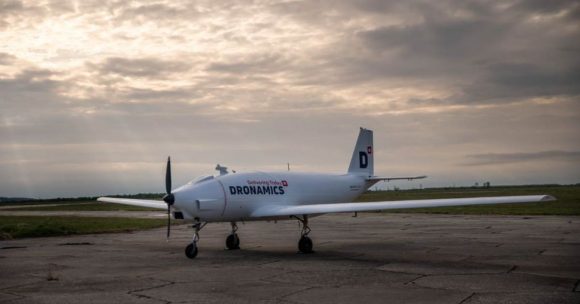The world’s first cargo drone airline, Dronamics, is blazing a trail in the middle-mile delivery space. Locate2u has closely followed the company’s developments in the last few months.
In an interview with Locate2u, Severina Grozeva, director of global communications and public relations, gives insight into the drone industry, even highlighting some challenges.
The company has recently partnered with Qatar Airways and Aramex. “The interline agreement will extend our network reach and offer clients, such as Aramex, the opportunity to move cargo seamlessly from global hubs to remote and underserved locations, which we will be serving,” says Grozeva.
Dronamics owns the middle-mile solution
Dronamics is on a mission to make same-day deliveries possible for everyone, everywhere. It designs, builds, and operates a high payload remotely piloted aircraft, Black Swan. It has a capacity of up to 350kg, like a small van. Black Swan can fly a distance of up to 2,500km – Kuala Lumpur to Tokyo in Japan, Taipei in Taiwan, or Perth in Australia.
The drone cargo specialist differentiates itself from last-mile delivery. “Since the very beginning our focus has been on the middle-mile, as we believe that this is where cargo drones can make a huge difference,” says Grozeva.
Drone delivery is a game-changer
We see companies around the world investing in getting products to customers quickly. Walmart recently expanded its delivery service to 1.8 million more homes in Dallas Fort-Worth, Texas.
“The trends show increasing demand for faster, cheaper, and more sustainable deliveries. E-commerce is a growing industry with increasing demand. 62% of shoppers expect online orders to arrive in less than 3 business days; the majority of them within 24 hours,” says Grozeva.
Companies have realized the difference drones can make. Delivery providers don’t have to compete with peak-hour traffic to get parcels to customers on time – drones fly directly to a destination, no hassle.
“Cargo drones represent a huge opportunity for more efficient and cost-effective delivery, especially in the middle-mile and particularly in remote or hard-to-reach areas. Cargo drones can bridge the gap in access to goods and services for remote communities, enabling them to receive deliveries quickly and efficiently,” she says.
Artificial intelligence in drone delivery
Artificial intelligence is transforming the logistics industry and the way companies do business. A new report by Economist Impact and DP World titled ‘Trade in Transition 2024’ states advanced machine learning significantly improved the platelet supply chain, achieving a 54% reduction in expired platelets and eliminating ad hoc transport costs,while maintaining high delivery reliability.
“Technology has always been the driving force behind aviation in general. Auto-pilots have been used in aircrafts for nearly a hundred years! Automation and advanced technologies have the potential to enhance safety, efficiency, and reliability in aviation, says Grozeva.
Despite the move to automation, one thing is certain – humans are still needed. “It’s essential to note that automation doesn’t mean full autonomy. A human operator remains integral, underscoring the continued importance of human expertise in air cargo as well as in ground handling operations,” she says.
Challenges faced by the drone delivery industry
Grozeva says the challenges the industry faces are often regulatory or operational. “On the regulatory side, the EU has taken a progressive, risk-based approach to BVLOS operations.”
Dronamics was the first cargo drone operator in its segment to receive authorization, a LUC (EU’s Light UAS Operator Certificate) issued by Transport Malta in May 2022 and valid/recognised in all EASA member states.
“On the operational side, testing and trialing a new technology is a process. We are taking a ‘crawl, walk, run’ approach and investing the time and care needed to learn from the test program and optimize aircraft before moving into commercial operations.”
Future of drone technology
Today, we see companies like Amazon delivering medicine via drones. Last year the company introduced a 60-minute medicine drone delivery service.
“The cargo drone sector has seen significant development and growth in recent years. As the technology and capabilities of cargo drones have improved, there has been increased interest and investment in their use for logistics and transportation, says Grozeva.
In 2024, Dronamics is focused on setting up the start of its commercial operations in Greece, while continuing to explore new markets.
About the author
Sharl is a qualified journalist. He has over 10 years’ experience in the media industry, including positions as an editor of a magazine and Business Editor of a daily newspaper. Sharl also has experience in logistics specifically operations, where he worked with global food aid organisations distributing food into Africa. Sharl enjoys writing business stories and human interest pieces.










